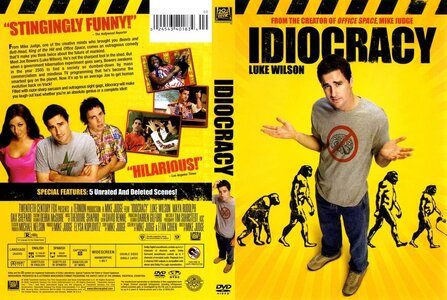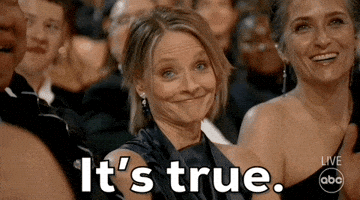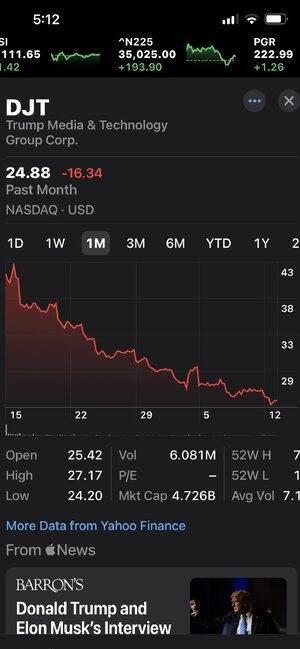Navigation
Install the app
How to install the app on iOS
Follow along with the video below to see how to install our site as a web app on your home screen.
Note: This feature may not be available in some browsers.
More options
You are using an out of date browser. It may not display this or other websites correctly.
You should upgrade or use an alternative browser.
You should upgrade or use an alternative browser.
Trump Catch-All | Trump on medical disclosure claims to be healthiest ever
- Thread starter nycfan
- Start date
- Replies: 786
- Views: 20K
- Politics
- Messages
- 8,349
Meanwhile, Trump is suing DOJ about the search of MAL, claiming $100 million punitive damages and $15 million legal fees. And he releases a coordinated campaign video — trying to grab back the narrative of himself as victim, I guess.
The suit itself is BS. But who knows what kind of MAGA appointee he might get.
The suit itself is BS. But who knows what kind of MAGA appointee he might get.
- Messages
- 758
Currently down 7.3% from Friday's close...DJT is down 4.77% today in trading on NASDAQ, though in part because it had a weird spike to start the day. Still, as of now, toggling above/below $25/share (which is still way higher than is justified other than as a political meme stock).
- Messages
- 415
Seriously, how do you sue an advertiser for NOT buying ad space on your media platform?So they are joining musk in his stupid case against advertisers, wow.
This should be thrown out of the courts as frivolous and all participants should be fined for wasting the courts resources.
And yes, not only joining the ridiculous lawsuit but telling MAGA types to boycott Dunkin.
I sometimes attempt a little "thought experiment" about Trump. Here is a good example: Imagine that you have been in a coma since about 2015 and you just came out of it. You know nothing about Trump and the first thing you see is his post about Harris's people faking pictures of her crowd at the airport. [Assume that the fact of "twitter" and the existence of AI were somehow known to your post-coma self.]
I honestly think that even if you knew nothing about Trump's thousands of lies and crimes and uncivil acts, the mere insanity in that single tweet would be enough for most sane voters to conclude that OF COURSE this guy should not be POTUS.
Somehow we as a society (and our press) has grown so accustomed to his behavior that we are no longer sufficiently appalled.
- Messages
- 1,599
Meanwhile, Trump is suing DOJ about the search of MAL, claiming $100 million punitive damages and $15 million legal fees. And he releases a coordinated campaign video — trying to grab back the narrative of himself as victim, I guess.
The suit itself is BS. But who knows what kind of MAGA appointee he might get.
Like Cuban said, dumb as a ham sandwich.
donbosco
Honored Member
- Messages
- 840
KishiKaisei
Distinguished Member
- Messages
- 349
I sometimes attempt a little "thought experiment" about Trump. Here is a good example: Imagine that you have been in a coma since about 2015 and you just came out of it. You know nothing about Trump and the first thing you see is his post about Harris's people faking pictures of her crowd at the airport. [Assume that the fact of "twitter" and the existence of AI were somehow known to your post-coma self.]
I honestly think that even if you knew nothing about Trump's thousands of lies and crimes and uncivil acts, the mere insanity in that single tweet would be enough for most sane voters to conclude that OF COURSE this guy should not be POTUS.
Somehow we as a society (and our press) has grown so accustomed to his behavior that we are no longer sufficiently appalled.

Idiocracy | Rotten Tomatoes
In 2005, average in every way private Joe Bowers (Luke Wilson) is selected to take part in a secret military experiment to put him in hibernation for a year along with a woman named Rita (Maya Rudolph). The slumbering duo is forgotten when the base they are stored on is closed down and are left...

- Messages
- 8,349
“…
Former President Donald Trump’s campaign flew in a blue Gulfstream jet formerly owned by sex trafficker Jeffrey Epstein, using it to travel to several campaign fundraisers over the weekend, the Miami Herald has confirmed.
Trump, enroute on his own private plane to a campaign event in Bozeman, Montana last week, unexpectedly landed in Billings because of mechanical problems, a campaign spokeswoman said. He and part of his staff then flew on a small charter to Bozeman for a rally Friday night.
The next day, he switched to another larger Gulfstream with a serial number that matches a plane once owned by Epstein, his former neighbor in Palm Beach, the campaign confirmed.
“The campaign had no awareness that the charter plane had been owned by Mr. Epstein,” the spokeswoman said, adding that the charter was commissioned by a vendor that has often been used by the campaign. “We heard about the former owner through the media.”
Read more at: https://www.miamiherald.com/news/politics-government/article290986070.html#storylink=cpy
Former President Donald Trump’s campaign flew in a blue Gulfstream jet formerly owned by sex trafficker Jeffrey Epstein, using it to travel to several campaign fundraisers over the weekend, the Miami Herald has confirmed.
Trump, enroute on his own private plane to a campaign event in Bozeman, Montana last week, unexpectedly landed in Billings because of mechanical problems, a campaign spokeswoman said. He and part of his staff then flew on a small charter to Bozeman for a rally Friday night.
The next day, he switched to another larger Gulfstream with a serial number that matches a plane once owned by Epstein, his former neighbor in Palm Beach, the campaign confirmed.
“The campaign had no awareness that the charter plane had been owned by Mr. Epstein,” the spokeswoman said, adding that the charter was commissioned by a vendor that has often been used by the campaign. “We heard about the former owner through the media.”
Read more at: https://www.miamiherald.com/news/politics-government/article290986070.html#storylink=cpy
- Messages
- 8,349
(Cont’d)
“…
The campaign spokeswoman confirmed that a decal with the words “Trump 2024” was placed on Epstein’s old plane for the trip. Trump’s own private plane, a 727 named “Trump Force One,” was having mechanical difficulties, which led them to land in Billings, about two hours east of Bozeman.
After Bozeman, Trump used Epstein’s old plane to travel Saturday to a fundraiser in Jackson Hole, Wyoming, and then to Aspen and Denver. “Trump Force One” was then able to pick Trump up in Denver. Epstein’s old plane was only used one day, the spokeswoman said. …”
Read more at: https://www.miamiherald.com/news/politics-government/article290986070.html#storylink=cpy
——
Rumor has it the “mechanical issue” was more like a mechanic’s lien — municipalities he owes money refusing to let his campaign plane land without first clearing outstanding bills from his 2018 campaign swings through Montana.
“…
The campaign spokeswoman confirmed that a decal with the words “Trump 2024” was placed on Epstein’s old plane for the trip. Trump’s own private plane, a 727 named “Trump Force One,” was having mechanical difficulties, which led them to land in Billings, about two hours east of Bozeman.
After Bozeman, Trump used Epstein’s old plane to travel Saturday to a fundraiser in Jackson Hole, Wyoming, and then to Aspen and Denver. “Trump Force One” was then able to pick Trump up in Denver. Epstein’s old plane was only used one day, the spokeswoman said. …”
Read more at: https://www.miamiherald.com/news/politics-government/article290986070.html#storylink=cpy
——
Rumor has it the “mechanical issue” was more like a mechanic’s lien — municipalities he owes money refusing to let his campaign plane land without first clearing outstanding bills from his 2018 campaign swings through Montana.
superrific
Inconcievable Member
- Messages
- 2,737
The claim was that it was a coordinated boycott. That can be actionable under antitrust law. This lawsuit . . . well, I doubt it goes anywhere but it might survive a motion to dismiss on the pleadings. The problem here is that 1) the boycott as alleged didn't have any way of enforcing any boycott terms; and 2) it was not aimed at twitter specifically. While a group boycott doesn't HAVE to be aimed at a single market participant (or a handful of related participants), it's certainly more comprehensible as a group boycott that way.Seriously, how do you sue an advertiser for NOT buying ad space on your media platform?
And yes, not only joining the ridiculous lawsuit but telling MAGA types to boycott Dunkin.
For instance: 1) makers of blueberry muffins decide they are paying too much for blueberries. They ask the blueberry farmers to cut their prices. Some agree to do so. One doesn't, and the blueberry muffin makers agree not to buy from that blueberry farmer unless it lowers its price. That's actionable under the Sherman Act. By contrast:
2. makers of blueberry muffins put out a statement saying, "we are only interested in buying blueberries that meet the following quality standards: the blueberries cannot be more than 1% bug by weight." Some blueberry farmers cannot meet the standard, and the makers don't buy from them. Not actionable. The motivation was not anti-competitive. It was not trying to use market power (at least not on this hypothetical). The statement was just trying to communicate to blueberry farmers a minimum level of quality that the muffin makers were looking to buy.
I certainly view the Musk lawsuit as much more like scenario 2 than scenario 1. That twitter was the only platform to backslide on content moderation doesn't mean it was uniquely targeted.
Plus, Musk's statement that the advertisers can all go fuck themselves is likely to be a very bad fact for him.
It would seem to be a classic strategic lawsuit against public participation. Unfortunately, last I looked, the 5th Circuit refuses to apply Texas anti-SLAPP law. The feds really need to pass a national SLAPP law to assist with BS cases like this.The claim was that it was a coordinated boycott. That can be actionable under antitrust law. This lawsuit . . . well, I doubt it goes anywhere but it might survive a motion to dismiss on the pleadings. The problem here is that 1) the boycott as alleged didn't have any way of enforcing any boycott terms; and 2) it was not aimed at twitter specifically. While a group boycott doesn't HAVE to be aimed at a single market participant (or a handful of related participants), it's certainly more comprehensible as a group boycott that way.
For instance: 1) makers of blueberry muffins decide they are paying too much for blueberries. They ask the blueberry farmers to cut their prices. Some agree to do so. One doesn't, and the blueberry muffin makers agree not to buy from that blueberry farmer unless it lowers its price. That's actionable under the Sherman Act. By contrast:
2. makers of blueberry muffins put out a statement saying, "we are only interested in buying blueberries that meet the following quality standards: the blueberries cannot be more than 1% bug by weight." Some blueberry farmers cannot meet the standard, and the makers don't buy from them. Not actionable. The motivation was not anti-competitive. It was not trying to use market power (at least not on this hypothetical). The statement was just trying to communicate to blueberry farmers a minimum level of quality that the muffin makers were looking to buy.
I certainly view the Musk lawsuit as much more like scenario 2 than scenario 1. That twitter was the only platform to backslide on content moderation doesn't mean it was uniquely targeted.
Plus, Musk's statement that the advertisers can all go fuck themselves is likely to be a very bad fact for him.
- Messages
- 1,160
The claim was that it was a coordinated boycott. That can be actionable under antitrust law. This lawsuit . . . well, I doubt it goes anywhere but it might survive a motion to dismiss on the pleadings. The problem here is that 1) the boycott as alleged didn't have any way of enforcing any boycott terms; and 2) it was not aimed at twitter specifically. While a group boycott doesn't HAVE to be aimed at a single market participant (or a handful of related participants), it's certainly more comprehensible as a group boycott that way.
For instance: 1) makers of blueberry muffins decide they are paying too much for blueberries. They ask the blueberry farmers to cut their prices. Some agree to do so. One doesn't, and the blueberry muffin makers agree not to buy from that blueberry farmer unless it lowers its price. That's actionable under the Sherman Act. By contrast:
2. makers of blueberry muffins put out a statement saying, "we are only interested in buying blueberries that meet the following quality standards: the blueberries cannot be more than 1% bug by weight." Some blueberry farmers cannot meet the standard, and the makers don't buy from them. Not actionable. The motivation was not anti-competitive. It was not trying to use market power (at least not on this hypothetical). The statement was just trying to communicate to blueberry farmers a minimum level of quality that the muffin makers were looking to buy.
I certainly view the Musk lawsuit as much more like scenario 2 than scenario 1. That twitter was the only platform to backslide on content moderation doesn't mean it was uniquely targeted.
Plus, Musk's statement that the advertisers can all go fuck themselves is likely to be a very bad fact for him.

This is the kind of post that makes this whole thing worthwhile. I love it.
superrific
Inconcievable Member
- Messages
- 2,737
1. Does anyone use antitrust law for SLAPP purposes. I didn't think anti-SLAPP laws would apply to Sherman Act claims. I know CA has a strong anti-SLAPP law so you probably know a fair bit about that, more than I do, but it doesn't make sense to characterize and antitrust suit that way.It would seem to be a classic strategic lawsuit against public participation. Unfortunately, last I looked, the 5th Circuit refuses to apply Texas anti-SLAPP law. The feds really need to pass a national SLAPP law to assist with BS cases like this.
2. I might regret asking, but on what basis does the Fifth Circuit refuse to apply Texas' law? I'm not aiming that comment at you. I mean, do I really want to know what BS that rogue circuit has come up with now? And the answer is, yeah kinda but also it won't break my heart if I never find out.
1. Yes. But apparently not in the 5th Circuit.1. Does anyone use antitrust law for SLAPP purposes. I didn't think anti-SLAPP laws would apply to Sherman Act claims. I know CA has a strong anti-SLAPP law so you probably know a fair bit about that, more than I do, but it doesn't make sense to characterize and antitrust suit that way.
2. I might regret asking, but on what basis does the Fifth Circuit refuse to apply Texas' law? I'm not aiming that comment at you. I mean, do I really want to know what BS that rogue circuit has come up with now? And the answer is, yeah kinda but also it won't break my heart if I never find out.
2. It unduly interferes with federal rules of civil procedure.


